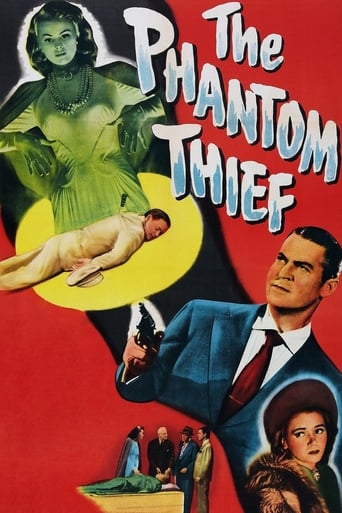mark.waltz
The spirits flow freely in this good "Boston Blackie" episode where the occult and a blackmail ring go hand in hand, leading to murder. It's a mixture of mystery and comedy, and when George E. Stone says, "Well I'll be a monkey's uncle", you expect the old Bob Hope gag to occur with him. Chester Morris is aiding blackmail victim Jeff Donnell and this leads him into the traps of sinister mediums (Marvin Miller and Forbes Murray) and their sexy but deadly assistant (Dusty Anderson). Richard Lane and Frank Sully spent much of this series switching between smart and stupid, and it's back to buffoonery for them here. I give this one a higher than just average simply for an interesting setup, believable characters, comedy that doesn't grate on your nerves and flowing by seamlessly without unnecessary distractions or needless schtick concerning Morris and Stone's penchant for impressions.
blanche-2
In "The Phantom Thief," Boston Blackie (Chester Morris) is as usual blamed for anything that goes wrong on Inspector Farraday's (Richard Lane) watch. This time, as he attempts to help a friend of the Runt's (George E. Stone) return some jewels he didn't mean to steal, Blackie finds himself involved with a phony medium (Marvin Miller), blackmail, and murder, all the while trying to hide from Farraday, sometimes in plain sight.Not a bad entry into the series, with Jeff Donnell, who was actually a character actress, playing a duped, wealthy woman with rotten taste in men. She handles her part well, considering she usually played a bubbly, wisecracking friend. Marvin Miller, with dark makeup and that sonorous voice, is effective as the medium. Boomers may remember him as John Beresford Tipton's go-to Mr. Anthony on "The Millionaire." Unfortunately he never made it to my house.Chester Morris is charming and funny as Blackie, but this time he's not particularly ably assisted by The Runt, who is terrified of all those disembodied hands and skeletons at the séance.Fast-moving and entertaining.
Michael_Elliott
Phantom Thief, The (1945) ** 1/2 (out of 4) Boston Blackie (Chester Morris) once again finds himself involved in a murder case where ghosts and a weird fortune teller are suspects. This isn't the best in the series but it's not the worst either and in the end it makes for an entertaining 65-minutes. The mystery this time out is pretty predictable and easy to follow but there are some nice added touches including all the stuff involving the ghosts. The supporting cast is up to their usual nice quality with Richard Lane and George E. Stone back to their old tricks as Farraday and The Runt.
Neil Doyle
The Runt tries to help a friend accused of stealing stolen jewelry and that's how the plot of this Blackie entry starts. Naturally, the police are one step behind Blackie when the plot advances to include a Dr. Nejino who runs seances and has a lovely assistant, model DUSTY ANDERSON who towers over the rest of the cast. It seems the doctor badly wants to get his hands on the stolen necklace.Dr. Nejino invites Blackie to attend one of his seances so he can witness the effect it has on one of his eccentric women patients (JEFF DONNELL). It turns out that she's had a relationship with Dr. Nejino and wants her stolen necklace back.The script has Blackie and Inspector Farraday exchanging comic quips and sarcasm over the dead body of Blackie's friend who has been stabbed to death at the seance--one of the story's many unrealistic touches where clever lines rule the day no matter what the situation. The same thing happens with the next murder victim.It's formula stuff again, with Blackie and The Runt being falsely accused of having something to do with two murders and having to prove their innocence.GEORGE E. STONE is more annoying than usual as the wimpy Runt, especially during the scene at the seance. DUSTY ANDERSON gives a limp performance as Nejino's pretty assistant and the rest of the cast is strictly by the numbers.The formula was wearing thin long before this entry was released, but I suppose these films had a certain appeal for audiences when they played the lower half of a double feature bill.


